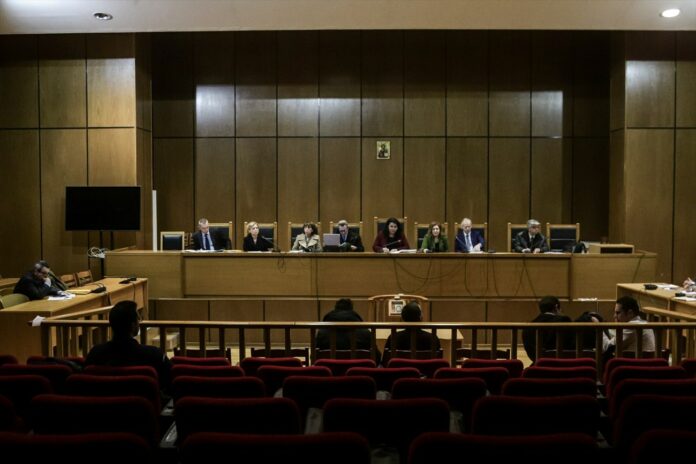A long-awaited conclusion in the explosive Golden Dawn (Chryssi Avgi) trial is expected on Wednesday, with a three-justice appeals court ready to hand down verdicts against 68 defendants. The most serious charges involve control and membership in a criminal organization operating under the guise of a political party.
The charges are the product of a voluminous indictment that was compiled through a lengthy police and prosecutorial investigation into the far-right group, which critics charge is a genuine neo-Nazi formation, and all in the wake of the brutal stabbing death of rapper Pavlos Fyssas on the evening of Sept. 18, 2013 in the working-class Piraeus-area municipality of Keratsini.
Yet what appeared at the time as a “cut-and-dry” case of first-degree homicide expanded into a single but deliberate investigation, then a massive indictment and a long-drawn out court case. Prosecutors at the time declined to prosecute the suspect, mid-level Golden Dawn cadre Giorgos Roupakias, alone in a murder trial, but instead included the entire extremist political grouping in an indictment.
Roupakias at the time freely confessed to the murder of Fyssas, known for his anti-fascist lyrics and local political involvement, while several eyewitnesses also corroborating the fact that he stabbed the unarmed victim in the middle of the road shortly after a disturbance and following a televised football match. Other evidence surfaced that the suspect knew and despised the victim, due to political differences. Υet more evidence emerged, almost from the beginning of the probe, that Roupakias called other GD cadres before and after he stabbed Fyssas.
The result was a marathon trial that took five and a half years and 453 sessions, and fielded 216 witnesses taking the stand.
The primary suspects, including Roupakias and GD founder and president Nikos Michaloliakos, remained incarcerated pending trial for the maximum allowed period of 18 months, and are today free on bail.
The justice minister at the time, Nikos Dendias, today’s foreign minister in a center-right government, in 2013 submitted a detailed report to the chief prosecutor of the supreme court citing 32 incidents involving attacks and threats by GD leaders and cadres, and requesting that article 187 of the Greek penal code – which defines and outlaws criminal organizations – be examined for possible felony offenses.
Less than two years later a snap election came in January 2015, with resulted in a coalition between radical leftist SYRIZA party and a small right-wing populist party, the Independent Greeks (AN.EL), which acted as the former’s prop to maintain a Parliament majority and thereby form and field a government, and wield power.
However, it was Golden Dawn’s showing in the January 2015 that shocked much of the country and had reverberations abroad. A virulently anti-memorandum and anti-EU Golden Dawn re-entered Parliament by taking 6.3 percent of the general vote (of valid ballots) and electing 17 out of the 300 MPs, even as Roupakias faced murder charges and with much of GD’s leadership also slapped with felony charges.
In the next four-and-a-half-years of a SYRIZA-AN.EL coalition government, GD deputies, in fact, voted with the coalition majority on a handful of draft bills that required an increased majority (180 out of 300 MPs for ratification), such as the contentious legislation making Greece’s election system even more simple representational.
Additionally, numerous delays plagued the trial from the beginning, such as not finding a big enough venue – a responsibility of both the now SYRIZA-led justice ministry and the independent judiciary – while the three appellate-level judges were initially not not recused from other cases and caseloads.
A decision by a council of appellate justices sending the 69 defendants to trial (one has since died) was issued on Feb. 4, 2015, some two weeks after SYRIZA and other anti-memorandum and anti-austerity parties swept into Parliament and power atop a tide of public dissatisfaction with the country’s two mainstream parties, New Democracy and PASOK.
Back to the present, the prosecutor in the case has recommended guilty verdicts against all the defendants on a multitude of felony and misdemeanor counts.














